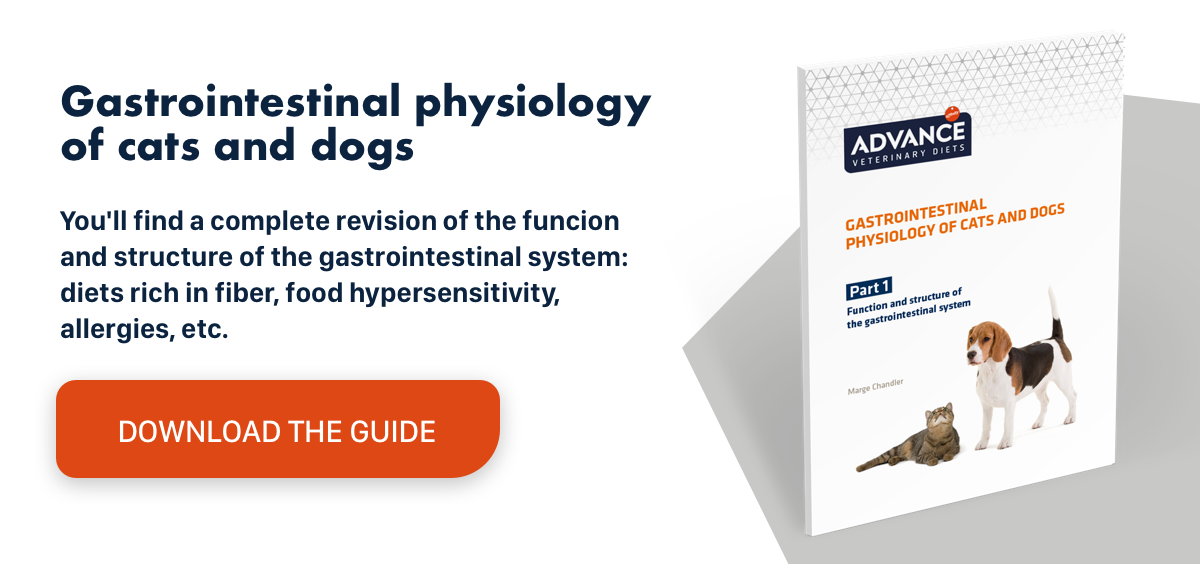Vomiting and diarrhoea in dogs: effects of bioactive proteins
Leading causes of vomiting and diarrhoea in dogs
Gastroenteritis is due to inflammation of the stomach and small intestine, which leads to vomiting and diarrhoea in dogs, often accompanied by abdominal pain. The various causes include:
- Poisoning from spoiled food, contaminated water, toxic plants, etc.
- Intestinal infection of protozoa, viruses or harmful bacteria, transmitted from another dog.
- Gorging on food.
- Lactose intolerance.
- Certain medicines.
- Reaction to antibiotic therapy.
- Severe or sustained stress.
- Underlying diseases.
Probiotics help reduce recovery time.
To demonstrate that the use of probiotics can reduce the recovery time for self-limiting acute diarrhoea in dogs, a case-control study looked at probiotic cocktails of thermo-stabilised Lactobacillus acidophilus given with live strains of Pediococcus acidilactici, Bacillus subtilis, Bacillus licheniformis and Lactobacillus farciminis.
The time from start of treatment to the last abnormal stool was significantly shorter in the group of dogs receiving probiotics compared to placebo with mean times of 1.3 days and 2.2 days, respectively. The two groups were almost identical with respect to the time from the start of treatment to the last episode of vomiting.
How to improve intestinal health
The ADVANCE GASTROENTERIC LOW FAT diet was developed around three principles: intestinal protection, symptomatic relief of diarrhoea and improved intestinal assimilation. Here are just some of its indications:
- Gastrointestinal disorders: enteritis, gastritis, diarrhoea, inflammatory bowel disease, malabsorption, intestinal lymphangiectasia, and so on.
- Diseases of the pancreas: pancreatitis, pancreatic exocrine insufficiency.
- Hyperlipidaemia.
- Hepatitis without encephalopathy.
The diet’s benefits include:
- Bioactive plasma proteins: these modulate the intestinal immune system, helping to preserve mucosa integrity, while improving nutrient digestion and absorption.
- High glutamine level: glutamine is an amino acid which is thought to be the main energy source for enterocytes. It improves the function of the intestinal mucosa in cases of metabolic stress, cell wall injuries and during diarrhoeal episodes.
- Medium-chain triglycerides (MCT): improve the digestibility and absorption of fats, so they can be used more rapidly.
- With clay and a high rice content: the absorbent action of clay and high digestibility of rice generate smaller stools.
- Hydrolysed proteins: these facilitate the absorption of essential amino acids and the overall digestion process.
- Long-chain omega-3 fatty acids: provide an intestinal anti-inflammatory effect.
- Prebiotics (fructo-oligosaccharides): stimulate the growth of beneficial gut bacteria.
Its special ingredients include rice, corn, gluten and cornflour, dehydrated proteins, coconut oil, animal fats, hydrolysed animal proteins, hydrolysed soy protein, plasma proteins, calcium carbonate, monocalcium phosphate, potassium chloride, fish oil, fructo-oligosaccharides, vegetable fibre and sepiolite.
